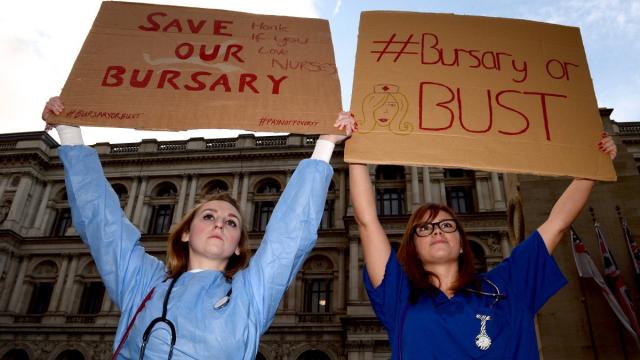
Angered by the Conservative government’s decision to scrap bursary payments and replace them with loans, thousands of student nurses and midwives marched recently through Britain’s streets in protest.
In a bid to save around £800 million ($1.1 billion) in annual spending, the government announced its decision to replace nurses' grants with loans in the 2015 Comprehensive Spending Review. The announcement created intense opposition, described by the Royal College of Nursing (RCN) as a “crushing blow.”
Marching under banners that read “Hands off our NHS,” the "Bursary or Bust" campaign has spawned widespread support among Britain’s nursing and midwifery community, as well as among union representatives and opposition MPs who also joined in the recent rallies.
The decision to substitute much-needed bursaries – which help ensure that the U.K.’s health service produces the nurses and midwives it so desperately needs – with loans that those nurses will have to painstakingly pay back through years of debt is being seen as the latest unacceptable attack on the National Health Service.
“Bursaries are an essential financial support and without them, many of us here today wouldn’t have been able to fulfill our dream of becoming a nurse,” Sylvia Duval, chair of the RCN Student Council, told Occupy.com. “Taking away these grants and replacing them with hefty loans will only pile on more personal financial pressure to an already overstretched part of the health care workforce."
Presently student midwives and nurses are entitled to a yearly NHS bursary from £1,000 ($1,400) to £4,000 ($5,600). The students are exempt from tuition fees and don’t have to pay the grant back. However, from August 2017 the Tories plan to scrap these vital funds for student nurses in training, who instead will be forced to take out loans that leave them saddled with debt just as they begin their career with the NHS.
Thousands of doctors signed a letter in support of the protest earlier this month – testament to the widespread opposition to the Tories’ latest move that is squeezing every penny out of an already sparse healthcare budget. More than 1,500 General Practitioners, consultants and junior doctors lent their support to the "Bursary or Bust" campaign, saying that in an era of “brutal cuts and spiralling workloads,” it’s “goodwill, compassion, dedication and tireless effort” that holds the NHS together.
Addressing the rally that took place outside 10 Downing Street in London, Heidi Alexander, the U.K.’s shadow health secretary, read out opposition leader Jeremy Corbyn’s message to National Health Service staff. “We must keep nursing bursaries for the next generation so that nurses can qualify, help all of us and not be lost to the profession,” Corbyn wrote.
Alexander reiterated Corbyn’s concerns, warning that the government was "taking a huge gamble” with the future of the NHS by cutting valuable grant funding. “First it was the junior doctors and now it is student nurses. We will oppose them and we will not let them put the future of the NHS at risk,” she said.
The protest, held the weekend before last, coincided with the historic junior doctors’ strike that rocked Britain. The 24-hour walkout by junior doctors was triggered when the government and the British Medical Association (BMA) failed to agree on a proposed new contract set by the Conservative government for junior doctors.
The contracts threaten longer hours, lower pay and increased stress, resulting in U.K. junior doctors working for as little as £10 ($14) an hour.
Saying that he would struggle to pay for his mortgage and household bills under the Department of Health’ s new junior doctor contract, Dr. Singh, a 34-year-old junior doctor in general medicine, told the Guardian: “I am not looking for parity of pay with my friends in the City. But if you can’t afford to pay your mortgage or your child’s nursery bills and you can’t look after your child yourself in the evening or [at] weekend because the government is proposing you should work those hours on a normal basis, you can’t continue with that kind of life.”
With cuts being planned for the salaries of junior doctors, and now long-standing and much-needed grants being cast on the scrapheap in exchange for debt-inducing loans for student nurses and midwives, the state of the NHS is a far cry from PM David Cameron’s pre-election pledge to increase health budgets by at least £8 billion a year by 2020.
Instead, it seems the Tories are doing everything in their power to cut NHS funding – and by doing so, to exacerbate an already chronic shortage of doctors, nurses and other healthcare professionals.
3 WAYS TO SHOW YOUR SUPPORT
- Log in to post comments















